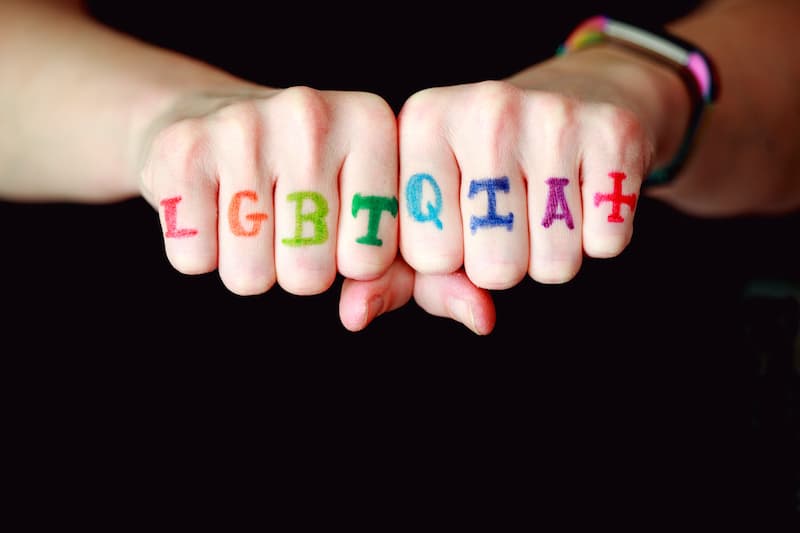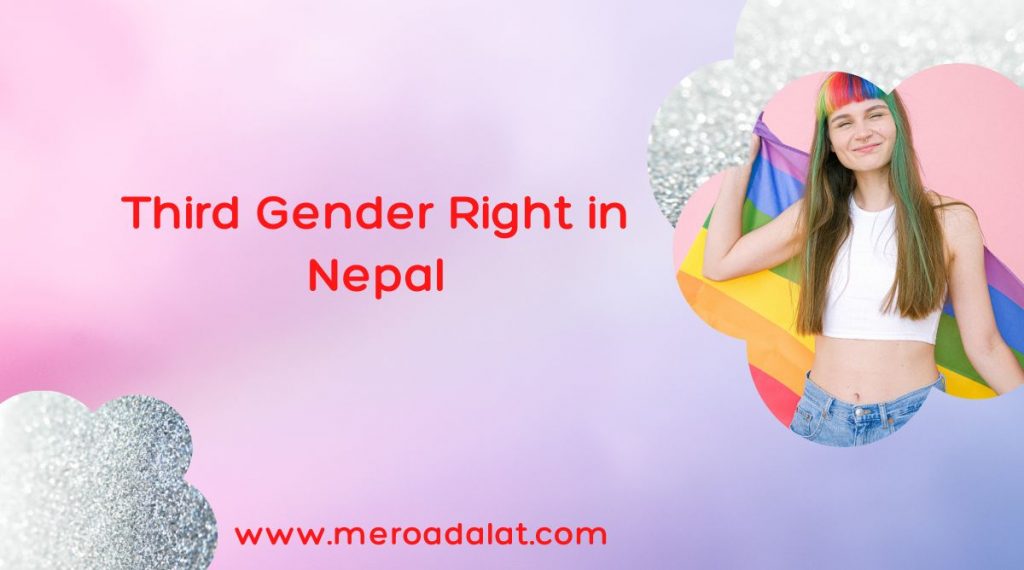This article will help you to know all about the third gender right in Nepal.
Categorization of Gender
- Homosexual and heterosexual categories are constructed based on people’s sexual orientation.
- Sexual orientation: It refers to a person’s physical, romantic, and/or emotional attraction towards other people.
- Heterosexual persons are attracted to the opposite sex. It may include an assumption that everyone is heterosexual & heterosexual relations are regarded as natural and normal.
- Homosexual persons are attracted to same-sex.
- LGBTQI stands for Lesbian, Gay, Bisexual, Transgender, Queer, and Intersex;
- Gay men and lesbians are attracted to individuals of the same sex as themselves;
- Bisexual people may be attracted to individuals of the same or different sex;(attracted to both women and men)
- Intersex persons are persons having both male and female sex organs.
- Transgender is an umbrella term used to describe a wide range of identities whose appearance and characteristics are perceived as gender atypical —including transsexual people, cross-dressers, and people who identify as the third gender.
- Queer is an umbrella term for sexual and gender minorities who are not heterosexual or are not cisgender.

Third Gender Right in Nepal
In Nepal, intersex persons are commonly called and understood as Hijada, chakka. They are called by different names in different geographical areas such as Fulu fulu in Mountain areas, Singaru in Western Hills, and Maugiya or Kothi in the Tarai region.
The blue diamond society is an LGBT rights organization in Nepal, established in 2001 to advocate for change in the existing laws against homosexuality and to advocate for the rights of sexual minority communities. Sunil Babu Pant is the first gay legislator in Nepal’s history.
Sunil Babu Pant and others vs. Nepal government and others,2007 (2064) is a ground-breaking decision on Gender identity and sexual orientation, recognizing equal rights of sexual minorities, including equal recognition before the law.
The Supreme Court decision ordered the government to issue citizenship certificates or identity cards that allow the selection of third gender, i.e., “other” to identify an individual’s sex and gender.
The constitution of Nepal,2072 includes several provisions pertaining to the rights of LGBT people.
– right to have identity cards along with preferred gender identity (article 12)
– prohibition on discrimination on any ground including sex or sexual orientation by the State (article 18,3)
– gender and sexual minority groups shall have the right to employment in state structure on the basis of the principle of proportional inclusion (article 42)
– gender-neutral terms.
– the right of access to public services.
Nepal’s official documents afford its citizens three gender options to choose from: Male, Female, and Other. Court had ordered the authorities to amend laws to provide citizenship and passport certificates to the third gender people under the other or” O” category.
Nepal’s National Census 2011 was the first census in the world to allow people to register themselves as a gender other than Male or Female.
Manoj Shahi (Monica shahi), a transgender (MTF) of Kailali, is the first recipient of category “O” in Machine-Readable Passport (MRP) in Nepal.

Same-Sex Marriage in Nepal
The court asked the Government to form a committee to study same-sex partnership laws in other countries and mandated that the new law not discriminate against sexual minorities;(Sunil Babu Pant and Others v. Nepal Government)
In January 2014, a committee was formed by the government to study international laws on same-sex marriage and prepare the report
In October 2016, the Ministry of Women, Children, and Social Welfare set up a committee for preparing a draft bill on the issue.
But same-sex marriage is not legalized in Nepal.
In July 2017, a couple successfully registered their marriage in the Dadeldhura District of far-western Nepal.
Muluki Civil Code 2074
Provisions relating to civil rights are mentioned in Chapter 3 of Muluki Civil Code 2074. According to section 17, every citizen shall be equal before the law and no citizen shall be deprived of equal protection of the law. Likewise, no discrimination shall be made in the application of general law on grounds of origin, religion, color, caste, race, sex, physical condition, or on similar other grounds as mentioned in section 18.
No person shall discriminate in any public and private place on grounds of origin, religion, color, caste, race, sex, physical condition or on similar other ground; and no person shall, on such ground, be prevented from using service, amenities or utilities of public use or from entering into a public place or public religious place or from performing religious act according to his or her will.
In terms of pay and social security benefits for the same work, no one may be discriminated against based on their sexual orientation. Any citizen may be appointed to a governmental or public office, but only on the basis of the qualifications specified by the law. No citizen shall be discriminated against in making such an appointment on the basis of national origin, religion, color, caste, race, sex, or similar other considerations.
Muluki Criminal Code 2074
Chapter 10 of muluki criminal code 2074 deals with the offense relating to discrimination and other degrading treatment. Section 160 prohibits making discriminatory treatment in any sense. Any authority that wields legal authority is not allowed to intentionally treat any citizen unfairly based on their place of origin, religion, color, caste, race, sex, physical condition, disability, state of health, or any other comparable grounds unless expressly permitted by law.
A penalty of imprisonment for a term not to exceed three years, a fine not to exceed thirty thousand rupees, or both sentences, may be imposed on a person who commits or causes to be committed the offense. Likewise, there is a legal provision not to abort after finding out the gender of the child.
According to section 188 (7), no person shall, with the intention of causing abortion, do, or cause to be done, any act by which the sex of the fetus is identified, and abort or cause abortion following such sex identification. Rape is a heinous offense that is prohibited and its prohibition is provided in section 219. Where a man has sexual intercourse with a woman without her consent or with a girl child below eighteen years of age even with her consent, the man shall be considered to commit rape on such woman or girl child.
Likewise, unnatural sexual intercourse is also considered to be a criminal offense. Without the other person’s consent, no one may engage in or cause to engage in unnatural sexual activity. A sentence of imprisonment for a term not to exceed three years and a fine not to exceed 30,000 rupees are the penalties for the offense.
Legal Status of Third Gender Rights
In the context of Nepal, although the third-gender community has gotten legal recognition and is entitled to fundamental rights by law, still there is a lot to improve. Following the historic ruling in Sunil Babu Pant v. Government of Nepal, Nepal gained a reputation as Asia’s most progressive nation when it came to recognizing the rights of third-gender groups.
In Nepal, the LGBTQ community is referred to as Sexual and Gender Minorities. The rights of LGBTQ people have been recognized by the courts and by the constitution, but they continue to face administrative and bureaucratic burdens, as well as a lack of inclusive legislative measures, which limit their ability to fully exercise their fundamental rights. In September 2015, several articles mentioning LGBTI rights in the country’s new Constitution were approved by Parliament after lengthy deliberation. They are ensured with fundamental rights such as the right to equality, the right to social justice e.t.c. which had third gender-friendly provisions.
The Constitution’s recognition of transgender people’s right to self-determination and the inclusion of their preferred names and gender markers in all official identity documents is their most notable right. Article 12 states that people have the right to have citizenship ID that reflects their preferred gender. Similarly, as mentioned in Article 18, the state cannot discriminate against any people on the basis of their gender and sex. The state also has the obligation in making special laws for the protection, empowerment, and advancement of gender and sexual minority groups.
Article 18 also lists LGBTI people among disadvantaged groups that are recognized by the Constitution and need protection from the state. Article 42 lists “gender and sexual minorities” among groups that will have the right to participate in state mechanisms and public services based on the “principle of inclusion” (Right to social justice).
The new Constitution, approved by the Constituent Assembly on 16 September 2015, includes several provisions pertaining to the rights of LGBT people but does not address same-sex marriage. Foreign same-sex spouses of Nepali citizens are eligible for a “Non-Tourist Visa” as a dependent, following a 2017 ruling by the Supreme Court of Nepal in the case of Suman Panta v. Ministry of Home Affairs.
Social Status of Third Gender Rights
Third Gender is usually out of the mainstream gender discourse and they face acute
neglect and discrimination because of their gender which makes it the most alienated and deprived gender, even more than women. Nepal being a developing country grounded by traditional practices and religious beliefs still looks upon third-gender groups in a derogatory way as a taboo. Progressive thoughts exist within the new generation but it’s really hard to educate society as a whole on this matter.
There exists law for their protection and upliftment but the societal perspective towards them is so disturbing and demeaning. However, we cannot expect the change to come overnight and the scenario seems to be gradually evolving. However, in Nepal, third-gender people have been socially recognized and have an important role in society.
They are seen as people who have the power to bless others with luck and prosperity. They are commonly called Hijada. As per Blue Diamond Society, they are known by different names in different geographical areas such as Fulufulu in the Mountain areas, Singaru in Western Hills, and Maugiya or Kothi in the Terai region. They are also known as metis (who are assigned male at birth but dress and behave as female). They have an important role at weddings and at the birth of children to bless and ward off evil spirits.
They are traditionally regarded as people having religious power to bless other people. Among Gurung people, there is a tradition of men dancing in female clothing, called maarunis, typically at barracks or at royal palaces, and are believed to bring good luck.
With time, we can see the changes going on in our county and in the minds of its citizen. People have started accepting their sexual orientation, social media is helping to promote awareness on this topic, there are a bunch of individuals out there who advocate for their recognition and equality who support them.
On the other hand, there also exists certain groups of individual who refers to their sexual orientation as taboo and find third-gender group of people insulting and bad impact on society. This social stigma is still rooted deep in Nepalese society. Marriage in Nepal is a religious and cultural institution rather than a civil one. It is the foundation for creating a family. So, same-sex marriage is not accepted by society. Men who have sex with men are frequently also married to women, and a procreative marriage is considered a successful one, whatever the sexual desires of the partners. Even though LGBTQ people have been recognized traditionally throughout Nepal, acceptance and acknowledgment of homosexuality and same-sex marriage are relatively new.
Families often keep homosexuality secret for the fear of shame. Before the third gender people were suppressed to another level, their voices were unheard, and they were humiliated for being the way they are and who they are, and some people often referred to their identity as a disease.
Even the state gave no recognition to them. After the remarkable case of Sunil Babu Pant v. Nepal Goverment and others, the third-gender groups were given legal rights to identify themselves and enjoy their rights without discrimination. Since then, societal dynamics have changed and efforts are being put together for their upliftment.
Conclusion
Third-gender right in Nepal is the essential right that is needed to be provided to third-gender people. Every human being is equal and they are free to enjoy every human right despite their gender. So third-gender rights must be effectively provided to the people. It’s our responsibility to respect each person’s freedom to self-identify as to their gender and sexual orientation. The state shall oppose homophobic and transphobic violence, therefore legal recognition and protection from the state are crucial for people to live with dignity and freedom in society.

Good Articale Aayusha jee